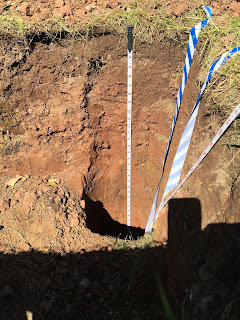Our Animal & Plant Plant Biotechnology Students have a lab activity where they need to identify a culprit using DNA samples. This multi-day activity provides students DNA samples from a "crime scene" and from five suspects. Students are asked to use procedures from a prior lab to complete the investigation in an attempt to properly identify which culprit puppy chewed the show.
This year I decided to invite the Law & Public Safety program to participate with this. It provided a great opportunity for my Animal & Plant Biotech Students to teach others what they have learned so far this year. My students loved this opportunity and they appeared to thrive.
The Law and Public Safety Students learned basic biotech skills that are used in a CSI type lab: micropipetting, centrifuging, electrophoresis, and keeping a lab notebook. They seemed to enjoy the multi-day lesson and we concluded with reviewing the steps completed by listing steps for performing this complex procedure.
Above you can see Agricultural Science students in white lab coats leading teams composed of Law and Public Safety Students. Here they are preparing their DNA samples for a separation technique called electrophoresis.
Seen above here, Law and Public Safety Students are loading thier DNA samples into electrophorsis chambers like CSI investigators would. Here they are attempting to answer the question of "which puppy chewed the shoe?"
After DNA was run through an agarose gel in the electrophoresis process, the DNA fragments separated and created a "DNA fingerprint". Can you tell which puppy chewed the shoe?
After they analyzed their gels, and recorded their procedures and documented results, they then reviewed all the major steps completed from start to finish by doing some "floor graffiti" as we call it.
All students greatly benefited from the four day activity and we look forward to hosting another

































